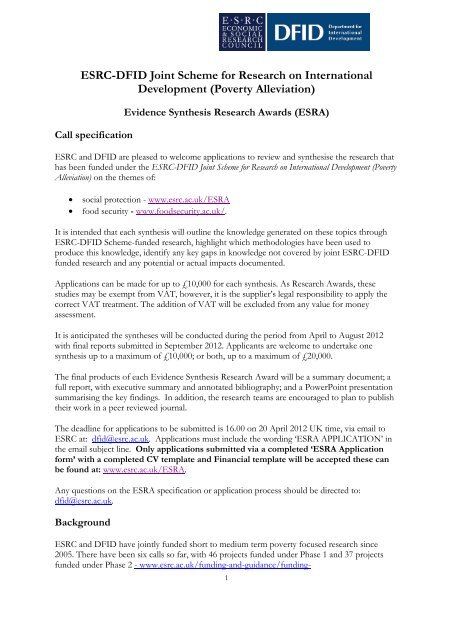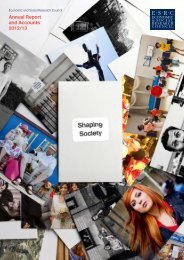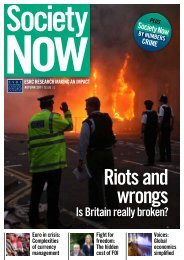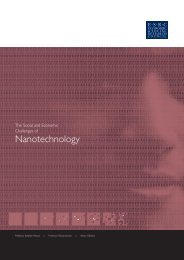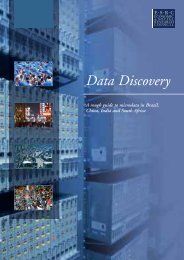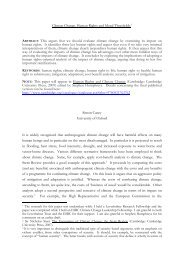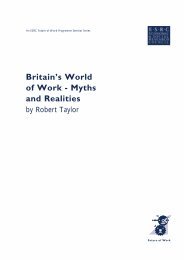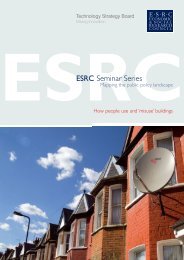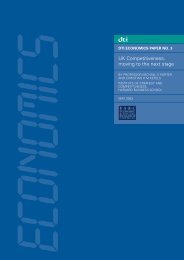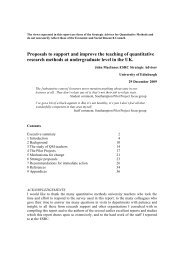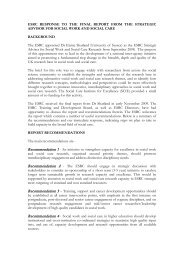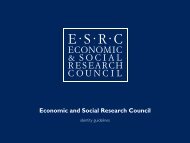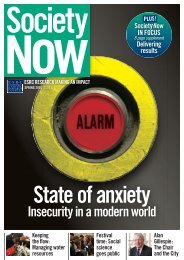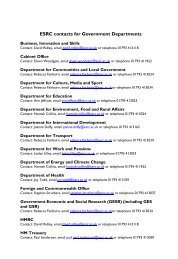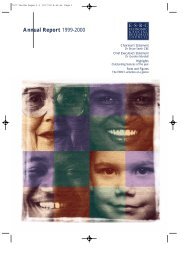ESRA tender document (PDF, 185Kb) - ESRC
ESRA tender document (PDF, 185Kb) - ESRC
ESRA tender document (PDF, 185Kb) - ESRC
Create successful ePaper yourself
Turn your PDF publications into a flip-book with our unique Google optimized e-Paper software.
<strong>ESRC</strong>-DFID Joint Scheme for Research on International<br />
Development (Poverty Alleviation)<br />
Call specification<br />
Evidence Synthesis Research Awards (<strong>ESRA</strong>)<br />
<strong>ESRC</strong> and DFID are pleased to welcome applications to review and synthesise the research that<br />
has been funded under the <strong>ESRC</strong>-DFID Joint Scheme for Research on International Development (Poverty<br />
Alleviation) on the themes of:<br />
• social protection - www.esrc.ac.uk/<strong>ESRA</strong><br />
• food security - www.foodsecurity.ac.uk/.<br />
It is intended that each synthesis will outline the knowledge generated on these topics through<br />
<strong>ESRC</strong>-DFID Scheme-funded research, highlight which methodologies have been used to<br />
produce this knowledge, identify any key gaps in knowledge not covered by joint <strong>ESRC</strong>-DFID<br />
funded research and any potential or actual impacts <strong>document</strong>ed.<br />
Applications can be made for up to £10,000 for each synthesis. As Research Awards, these<br />
studies may be exempt from VAT, however, it is the supplier’s legal responsibility to apply the<br />
correct VAT treatment. The addition of VAT will be excluded from any value for money<br />
assessment.<br />
It is anticipated the syntheses will be conducted during the period from April to August 2012<br />
with final reports submitted in September 2012. Applicants are welcome to undertake one<br />
synthesis up to a maximum of £10,000; or both, up to a maximum of £20,000.<br />
The final products of each Evidence Synthesis Research Award will be a summary <strong>document</strong>; a<br />
full report, with executive summary and annotated bibliography; and a PowerPoint presentation<br />
summarising the key findings. In addition, the research teams are encouraged to plan to publish<br />
their work in a peer reviewed journal.<br />
The deadline for applications to be submitted is 16.00 on 20 April 2012 UK time, via email to<br />
<strong>ESRC</strong> at: dfid@esrc.ac.uk. Applications must include the wording ‘<strong>ESRA</strong> APPLICATION’ in<br />
the email subject line. Only applications submitted via a completed ‘<strong>ESRA</strong> Application<br />
form’ with a completed CV template and Financial template will be accepted these can<br />
be found at: www.esrc.ac.uk/<strong>ESRA</strong>.<br />
Any questions on the <strong>ESRA</strong> specification or application process should be directed to:<br />
dfid@esrc.ac.uk.<br />
Background<br />
<strong>ESRC</strong> and DFID have jointly funded short to medium term poverty focused research since<br />
2005. There have been six calls so far, with 46 projects funded under Phase 1 and 37 projects<br />
funded under Phase 2 - www.esrc.ac.uk/funding-and-guidance/funding-<br />
1
opportunities/international-funding/esrc-dfid/phase1-awards.aspx (a further group of projects<br />
will be funded in 2012). The aim of the joint scheme is to provide a more robust conceptual and<br />
empirical basis for international development. It also aims to enhance the quality and impact of<br />
social science research which contributes to the achievement of the Millennium Development<br />
Goals and the shaping of the post-2015 agenda. Both funders have a strong commitment to<br />
commissioning world class research and ensuring that the resulting evidence is useful to<br />
stakeholders and policy makers.<br />
The scheme has funded a diverse range of high quality work so far but the Independent Review<br />
of Phase 1 - www.esrc.ac.uk/dfid-poverty/ suggested that the broad spread of work made it<br />
difficult to pull out generic lessons. As a response to this, resources were put in place within<br />
Phase 2 to fund the Strategic Advisory Team to take an overview of the scheme and to work<br />
towards greater understanding of scheme -funded research as a whole. In addition, separate<br />
resources were allocated to a range of synthesis products which would review the evidence that<br />
scheme -funded research had produced on a range of thematic areas.<br />
The <strong>ESRC</strong>-DFID Scheme has funded a diverse range of high quality research. To assist with<br />
developing a better understanding of the knowledge generated on specific topics, methodologies<br />
that have emerged, key gaps in knowledge not covered, and any potential or actual impacts<br />
<strong>document</strong>ed, we are undertaking a series of synthesis reviews of the commissioned research.<br />
These initial two syntheses will consider the substantial and interesting body of work developed<br />
on the themes of a) social protection and b) food security. It is anticipated that these syntheses<br />
will help inform the <strong>ESRC</strong> and DFID of the achievements of the joint research scheme.<br />
Aims of each synthesis<br />
The aim of each synthesis is to synthesise the evidence generated from <strong>ESRC</strong>-DFID funded<br />
research on a) social protection and b) food security and to draw together the commonalities and<br />
contrasts in findings from across the diverse range of research projects.<br />
The synthesis offers the opportunity to review the published research and research in progress<br />
produced by the scheme.<br />
Each successful applicant will:<br />
1. Identify and review all relevant reports, published articles and grey literature by the relevant<br />
research holders in either a) social protection or b) food security.<br />
2. Review the <strong>document</strong>ation comprehensively to answer the following questions:<br />
• What does scheme -funded research as a whole tell us about each of these two<br />
themes<br />
• What are the evidence and core findings from scheme-funded research<br />
• What methodologies have been used to generate scheme-funded knowledge on these<br />
two themes<br />
• What are the key gaps in knowledge not covered by the research<br />
• Provide an indication of areas of consensus and debate - do the findings reinforce or<br />
contradict each other If the latter, what are the main differences<br />
• Have any potential or actual impacts been <strong>document</strong>ed, and what are these<br />
2
It is anticipated that these questions will help develop a clear narrative on <strong>ESRC</strong>-DFID research<br />
in the areas of social protection and food security.<br />
It may also be useful to make direct contact with a small group of researchers to understand the<br />
context of their findings in more detail.<br />
The primary audiences for these synthesis reports include the research community, DFID,<br />
<strong>ESRC</strong>, other funders and users of research such as the policy community who may be interested<br />
in what key findings are being generated. This work not only sets out what scheme-funded<br />
research has covered, but also helps identify evidence gaps not currently covered by schemefunded<br />
research and any impacts identified.<br />
Outputs<br />
The outputs for each synthesis will be:<br />
(1) A stand alone summary <strong>document</strong> of not more than four pages which sets out all the<br />
key findings of the analysis.<br />
(2) A synthesis report of not more than 20 pages (excluding annexes) which sets out the<br />
key findings from the synthesis of research, lists the key findings on the use of<br />
methodologies, highlights where there has been real innovation in terms of new<br />
knowledge or methodologies, summarises if impacts have been <strong>document</strong>ed, and details<br />
the main knowledge gaps not covered by the research. The audience for this work is<br />
broad, so it is important that successful applicants think carefully about how they<br />
communicate through this report, paying attention to simplicity, structure, format and<br />
presentation. They should not assume strong knowledge on the part of the reader and<br />
should be prepared to ‘signpost’ the reader throughout the paper. Graphics, charts and<br />
diagrams will be helpful. The report will include an annotated bibliography as an annex,<br />
with up to two paragraphs on each academic output of scheme-funded research covered<br />
by the synthesis.<br />
(3) A Power Point presentation with brief speaker notes for a 15 minute presentation to<br />
funders should be produced.<br />
The final reports would be published under the joint <strong>ESRC</strong>/DFID Scheme. Templates for these<br />
outputs are given in the final page of this <strong>document</strong>.<br />
Funding terms and conditions<br />
Applications may be made for up to a maximum of £10,000 for the period of April to<br />
September 2012. As Research Awards these studies may be exempt from VAT, however, it is the<br />
supplier’s legal responsibility to apply the correct VAT treatment. The addition of VAT will be<br />
excluded from any value for money assessment. The two research syntheses do not fall within<br />
the Research Council Full Economic Costing (fEC) mechanism, and as such this will be<br />
undertaken via a contract between the successful applicant and the <strong>ESRC</strong>. The amount requested<br />
will cover the time spent researching and writing the synthesis.<br />
Requests for equipment funding are not anticipated.<br />
3
It is expected that the lead author of each synthesis will have a phone call/VC with <strong>ESRC</strong> and<br />
DFID at the start of the contract and at the draft report stage. In addition, the lead author will<br />
be asked to attend a meeting with the funders in the UK to present findings in person once the<br />
report is completed 1 . Costing for this meeting should be included in the budget.<br />
Eligibility<br />
The <strong>ESRC</strong> and DFID welcomes applications from researchers, normally located in a Higher<br />
Education Institute. Researchers in non-HE institutions, for example from government<br />
departments or from the third sector are also invited to apply. Researchers may be based in<br />
either UK or non-UK organisations with recognised research capacity.<br />
Applications from non-UK institutions are welcome. Applications from teams of people are also<br />
welcome.<br />
The decision making process<br />
Decisions on funding will be made by a panel in April. Applicants will be notified in writing of<br />
their success in w/c 30 April.<br />
Full timetable<br />
• Applications invited - 20 March<br />
• Applications deadline - 16.00 20 April 2012 (UK local time)<br />
• Assessment of applications - w/c 23 April<br />
• Successful applicant notified - w/c 30 April<br />
• Contract issued - By 14 May<br />
• Contract begins - 21 May<br />
• Inception meeting - Early June<br />
• Draft report - 30 July 2012<br />
• Final reports submitted - 10 September 2012.<br />
Applications<br />
Applications should be submitted by email to dfid@esrc.ac.uk. Applications must include the<br />
wording ‘<strong>ESRA</strong> APPLICATION’ in the email subject line. Applications must include the<br />
following <strong>document</strong>s:<br />
1. Completed application form (respecting the indicated word and page limits, using the<br />
Application Template- www.esrc.ac.uk/<strong>ESRA</strong>).<br />
2. CVs for all staff to be funded by the project (maximum of two pages, using the CV<br />
Template - www.esrc.ac.uk/<strong>ESRA</strong>).<br />
3. Financial spreadsheet (using the Financial Template - www.esrc.ac.uk/<strong>ESRA</strong>).<br />
1 If the lead author is not based in the UK, and the cost of attending a meeting is likely to be prohibitive, please<br />
contact dfid@esrc.ac.uk to discuss possible other options for this meeting.<br />
4
Stage 1. Eligibility check<br />
Proposals will be checked for eligibility on the following criteria:<br />
• All required <strong>document</strong>ation submitted and completed correctly. This will include<br />
checking that the correct templates have been used and word and page counts adhered to<br />
• Total budget (exclusive of VAT if appropriate) does not exceed £10,000 per synthesis<br />
Failure to meet the eligibility criteria will lead to the proposal being rejected at this stage.<br />
Stage 2. Assessment<br />
Applications will be assessed on the following criteria:<br />
• Understanding of the objectives and purpose of the synthesis<br />
• Knowledge and experience of the syntheses themes, including demonstrable knowledge<br />
of the wider literature and relevant research<br />
• Experience in research and in writing research synthesis products<br />
• Relevant experience and how this will be applied to the work<br />
• Value for money of bid<br />
• Quality of the proposed work plan and ability to deliver outputs to the required<br />
timetable.<br />
Final report requirements<br />
Stand-alone summary to cover: (Maximum 4 pages)<br />
• Key findings from the research synthesis<br />
• Key findings on the use of methodologies<br />
• Evidence of where there has been innovation<br />
• Identification of clear strengths or weaknesses in the research and research approach<br />
• Where impacts have been <strong>document</strong>ed<br />
• Where are the gaps - ie what has the scheme not been funding in the specified area<br />
Full report: (Maximum 20 pages)<br />
• Executive summary (maximum 1 page)<br />
• Main body of report<br />
o Purpose of the synthesis<br />
o Methods for the review<br />
o Details of what research has been funded on this topic - numbers of projects,<br />
geographical spread, and research questions covered.<br />
o What are the key findings from the research<br />
o What methodologies have been used for the generation of knowledge on this<br />
area<br />
o Where has there been innovation<br />
o Are there clear strengths or weaknesses in the research and research approach<br />
o Have any impacts been <strong>document</strong>ed<br />
5
o Where are the gaps - what has the scheme not been funding<br />
• Annotated bibliography listing all references (research outputs from the scheme) used<br />
with a one or two paragraph summary of the research context and findings.<br />
PowerPoint<br />
A visual representation of the executive summary, with brief presentation notes, for a<br />
presentation to funders lasting 15 minutes.<br />
6


